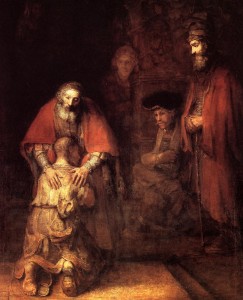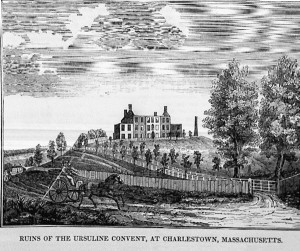Today, we look at the famous parable of the prodigal son. We all know the story and the characters in it. Let me do a quick review:
 The Younger Son: He decides to take his inheritance, so that he can turn his back on his roots and find what he considers true freedom doing what he wants.
The Younger Son: He decides to take his inheritance, so that he can turn his back on his roots and find what he considers true freedom doing what he wants.
The Older Son: Dedicated to his father and the family farm. Sees the brother walk away and turns angry that he is left with more work, less freedom in service to his father and the farm.
The Father: Loving man who sees beyond familial realities into the hearts of both sons. Is more merciful than the older son would like to see and the younger son would expect.
Often times, we take a look at the story through the eyes of each character usually one of the sons. I want to try something different.
It is no secret that the father represents God the Father. But are not we his representatives? If so, is not the father’s attitude supposed to be our attitude.
Who is the prodigal?
As I write this, as is usually the case, I am in Somerville, Massachusetts. My parish is a unique place as it is the more ethnic community of my city. The parish territory which was once part of Charlestown, Massachusetts includes the famous convent described in the book Fire and Roses, burned down in the early 19th century by non-Catholics who hated “Papists”. In various distances from three miles to five miles from here are such world famous institutions as Tufts University, The Massachusetts Institute of Technology, Harvard University, and Radcliffe. Universities such as these and others have professors who preach a secularism that rejects the Christian faith and Catholicism especially as a viable way of life in the world today. I know of one case where a visiting professor taught his students that only stupid people believe in God. In another university: Tufts: is one of the world class British atheists. That university is found by turning left at the end of my street and following that road (Broadway) straight until you drive right onto the campus.
the more ethnic community of my city. The parish territory which was once part of Charlestown, Massachusetts includes the famous convent described in the book Fire and Roses, burned down in the early 19th century by non-Catholics who hated “Papists”. In various distances from three miles to five miles from here are such world famous institutions as Tufts University, The Massachusetts Institute of Technology, Harvard University, and Radcliffe. Universities such as these and others have professors who preach a secularism that rejects the Christian faith and Catholicism especially as a viable way of life in the world today. I know of one case where a visiting professor taught his students that only stupid people believe in God. In another university: Tufts: is one of the world class British atheists. That university is found by turning left at the end of my street and following that road (Broadway) straight until you drive right onto the campus.
 It is often alleged that at least in some of these schools and others across the nation and the world, that there is a kind of glass ceiling to people of faith. If you want to get ahead in those environments, leave your faith at the door. Many parents lament that their children lose their faith in college, even some Catholic colleges. This grows throughout the society and as we can see today, we live in a society where many reject God, reject faith and spiritualize reality so that Jesus is kind of like Buddha. Massachusetts is one the most atheist states in the United States.
It is often alleged that at least in some of these schools and others across the nation and the world, that there is a kind of glass ceiling to people of faith. If you want to get ahead in those environments, leave your faith at the door. Many parents lament that their children lose their faith in college, even some Catholic colleges. This grows throughout the society and as we can see today, we live in a society where many reject God, reject faith and spiritualize reality so that Jesus is kind of like Buddha. Massachusetts is one the most atheist states in the United States.
Would it be safe to say that the adherents of these elements of our culture are the prodigals?
If we go back to the parable, we see that everything is fine with the younger brother until he loses his money and a famine strikes, then he is lost. This is a principle Jesus also teaches in Matthew in the parable of the house built on sand and the one built on rock. There are those who will turn their back on God and seek freedom in their own wisdom and pursuits and they will be successful for a time. Then when conditions beyond their control strike they find that they have no foundation. Everything they put their faith in dissolves and they have nothing.
When someone’s life falls apart and they reach the point the younger son does when he is eating less than the pigs, to whom can they turn? The parable says the Father, but you are his representative. Can you reach out? Can you reach out to one who made it his life’s work to reject your faith and you in the process?
There is also the other son. You can see him saying, you made your bed now lie in it. Indeed, if the person who spent so much time viciously rejecting you because of your Catholic faith found himself homeless on the street after a major change in society, would you help him or let him suffer the consequences. The answer to those questions depends on whether or not you are Catholic or believe in one of countless other faiths that reject the concept of forgiveness.
Our faith teaches us a wisdom that is beyond those who base their lives on nothing more than human  wisdom. Indeed, that world class atheist down the street asks the quite pertinent question: Do you need God to do the right thing? Obviously his answer is no. However, as we can see the fruit of our faith is not morality, it is wisdom. Our morality is the fruit of that wisdom. It is the wisdom that teaches us the deeper reality. Therefore, a question to the Atheist is not do you need God to do the right thing? But rather, If you don’t believe in God, at what level do you forgive? and why or why not?
wisdom. Indeed, that world class atheist down the street asks the quite pertinent question: Do you need God to do the right thing? Obviously his answer is no. However, as we can see the fruit of our faith is not morality, it is wisdom. Our morality is the fruit of that wisdom. It is the wisdom that teaches us the deeper reality. Therefore, a question to the Atheist is not do you need God to do the right thing? But rather, If you don’t believe in God, at what level do you forgive? and why or why not?
At present, like the father, we have to deal with the rejection of those who seek liberation in the human wisdom alone with no input from Divine Revelation. (Catholics believe in Faith and Reason. Atheists believe in reason alone and Christian fundamentalists believe faith alone.) There may come a time when their “human wisdom” will fail them. If they turn to the Father will you represent Him or will you represent the older son? Will you talk repentance or will you remind them of the consequences of their failed philosophies? Go back and read the parable and ask: are you the Father, the older son or younger son? Let me warn you, do not answer to quickly, but reflect this week for a time before you answer.
If you want to share your answers with me then e-mail me at catholicismanew. I will follow the Catholic blogging protocol used here in the USA: all e-mails are bloggable unless noted by the writer.
God bless you,
Fr. Robert J. Carr
Photo Credit:
Top and Top Middle: Public Domain
Bottom Middle and Bottom: Bigstockphoto.com Click on picture for photographer’s profile page.

